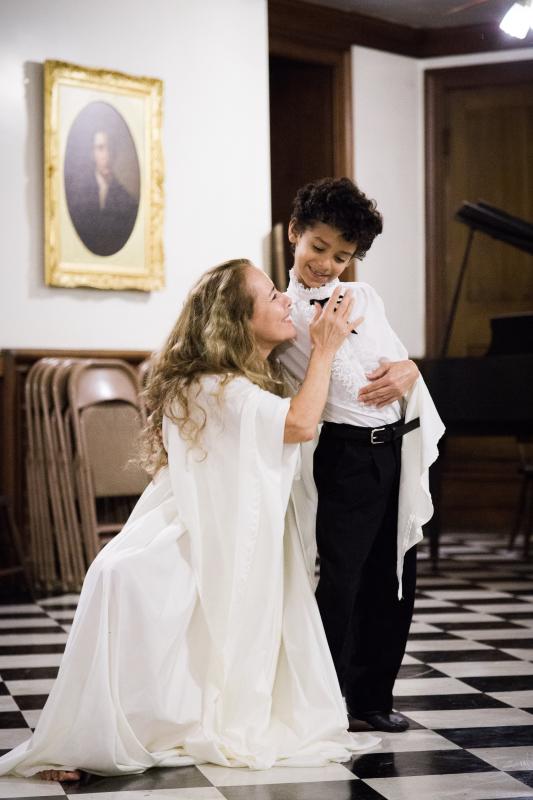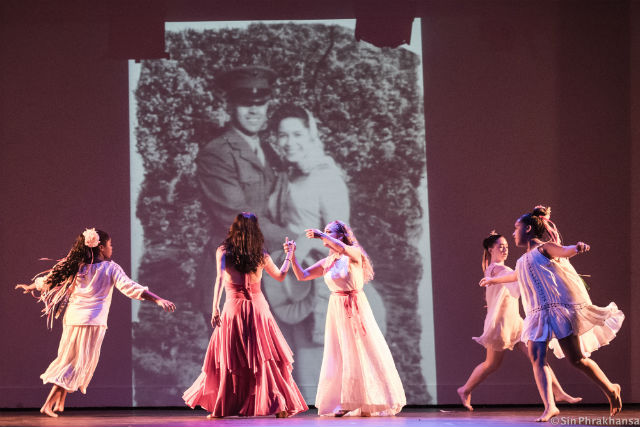Finding Love, Passion & Pride with the Latin Ballet of Virginia

When Ana Ines King was a young girl growing up in Colombia, she found herself easily distracted in the classroom. “Our school had beautiful, huge windows,” she remembered. “I looked at the sky, at the trees—even a butterfly made me distracted. It was hard for me to concentrate on the subjects I was learning.”
To help her focus, King’s mother, who was a professional dancer, began creating dances about her daughter’s school lessons, from history to geography to novels she was assigned. “That’s the way she helped me get good grades,” said King.
King went on to serve as the artistic director of the Santander Ballet in Colombia, and later served as faculty at Virginia Commonwealth University’s department of dance and choreography. But the lessons of her mother were never far from her mind. She drew from her childhood experience when she founded the Latin Ballet of Virginia in Richmond in 1997, a professional dance company whose performances are rooted in Latin American traditions. Educational programs are a central part of the company’s mission, many of which target low-income children and their families, who otherwise might not have an opportunity to experience dance.
The Latin Ballet has received six NEA grants over the years, a number of which have supported youth programming, including the organization’s main educational initiative, Be Proud of Yourself. The program has several components, including Everybody Reads!, which connects children with reading through book-inspired dance performances, as well as English as a Second Language (ESL) through Dance, which enables children new to the U.S. to quite literally move more comfortably through their new environments.
King saw the need for the ESL program when her own daughter began struggling in school following her move to Virginia. “My daughter was only 11 when she came to the United States,” said King. “It was really, really hard for her to adapt to the new environment and culture. She became very shy.” But during her school’s cultural appreciation day, when students were asked to present on their heritage, King saw her daughter transform. She performed the salsa, honoring one of Colombia’s most popular styles of dance. Her daughter’s eyes brightened, as did those of her classmates, as they each took turns proudly sharing their family’s traditions.

“When I go to schools for the ESL program, I go dressed up in a costume from Latin America,” said King. “A lot of kids from Latin America come and touch my dress. ‘Oh you talk like my mom!’ or ‘My sister has a dress similar to yours!’ The teachers say that before, these kids wouldn't even say one word.” The students, said King, are inspired to see a fellow immigrant “working in this country, wanting to succeed, leading the Latin Ballet…and still talking [with an accent]. I automatically see the eyes of the kids so bright and happy and proud.”
The first lesson King teaches in the ESL program is the posture practiced by flamenco dancers, which involves rolling the shoulders back. Standing up straight, and learning to look people in the eye when speaking, is part of the program’s mission to reshape the experience of children who may feel lost or alienated in their new homes. “If they love themselves, and feel confident and proud, then they can succeed, and they can love and help the others,” said King. “So that's one part of our lesson—how important it is to be proud.”
The Latin Ballet’s most recent grant will support Everybody Reads!, which will bring three separate performances to schools across the country. The first production, POEMAS, is based on the poems of Edgar Allan Poe, Alfonsina Storni, Pablo Neruda, and Federico Garcia Lorca; the second is NuYoRican, which tells the stories of Puerto Ricans who came to the United States following World War II; and the third is Momo, which is based on the eponymous 1973 fantasy novel by Michael Ende.
The program is a way to help bring material alive, and make literature more accessible. “Even if they're little kids, they're fascinated with the poetry,” said King. “It's easier to understand it when they see it in motion.”
For certain school performances, King brings along authors themselves when available. During the Latin Ballet’s upcoming school residency in a heavily Puerto Rican area of Queens, New York, for example, journalist and author Julia Torres Barden will hold discussions with students after performances of NuYoRican. Barden’s book, NewyoricanGirl...Surviving my Spanglish Life, served as the inspiration for the Latin Ballet’s NuYoRican production.
“[Barden] will talk about the book, why she wrote it, how she felt in the country when she was a little girl, and how important it is to remember your roots,” said King. “It's just so beautiful that the same girl from the book comes and talks with them, and then we go and represent what she's saying [through dance].”
Seeing the pride and confidence children gain from participating in Latin Ballet programs, or the new understanding they possess of literature and language, serves as a continual reminder for King of the belief that lies at the core of the company she founded 20 years ago. “Dance can save the lives of kids,” she said. “It can change the lives of entire families. That's the vision of the Ballet: helping—through love and passion and pride.”




